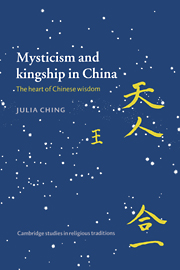Book contents
- Frontmatter
- Contents
- Preface
- 1 Son of Heaven: shamanic kingship
- 2 Son of Heaven: kingship as cosmic paradigm
- 3 The moral teacher as sage: philosophy appropriates the paradigm
- 4 The metaphysician as sage: philosophy again appropriates the paradigm
- 5 The paradigm enshrined: the authority of classics
- 6 The mystic as sage: religion appropriates the paradigm
- 7 The sage-king as messiah: religion again appropriates the paradigm
- 8 All under Heaven: political power and the periphery
- A glossary of Sino-Japanese names and terms
- Bibliography
- Index
8 - All under Heaven: political power and the periphery
Published online by Cambridge University Press: 15 December 2009
- Frontmatter
- Contents
- Preface
- 1 Son of Heaven: shamanic kingship
- 2 Son of Heaven: kingship as cosmic paradigm
- 3 The moral teacher as sage: philosophy appropriates the paradigm
- 4 The metaphysician as sage: philosophy again appropriates the paradigm
- 5 The paradigm enshrined: the authority of classics
- 6 The mystic as sage: religion appropriates the paradigm
- 7 The sage-king as messiah: religion again appropriates the paradigm
- 8 All under Heaven: political power and the periphery
- A glossary of Sino-Japanese names and terms
- Bibliography
- Index
Summary
INTRODUCTION
Just as the government of… a household is modelled on the government of one's self… on account of similitude, [the Chinese] came to equate the notion of a state to that of a house or family, with the ruler… representing the head of the family, thus arguing by virtue of an analogy from a family to a civil society.
The eighteenth-century German philosopher Christian Wolff is correct in his interpretation of Chinese political theory, as the Great Learning also demonstrates. And Wolff's works were read with admiration by Frederick II of Prussia, the European Enlightenment's model despot, a patron, for some time, of France's Voltaire, and like Wolff a friend of Chinese civilisation.
Enlightened despotism appears to have been a theory born of necessity, at a time when kings were all powerful. But there was no way to assure that a despotism, in Europe or China, would be enlightened. For China, the effects were and remain more serious, as the land area is large, and the population huge. We might add to geography and demography the dimension of time: the unusual dynamism of Chinese civilisation, and with it, the rule of the absolute monarchy, through history. Even in our own days, China's political behaviour behind a Bamboo Curtain and also otherwise has led to charges that it still considers itself centre of the world, refusing to accept norms from elsewhere.
If there are parallels, there are also differences with Western European civilisation.
- Type
- Chapter
- Information
- Mysticism and Kingship in ChinaThe Heart of Chinese Wisdom, pp. 235 - 271Publisher: Cambridge University PressPrint publication year: 1997



